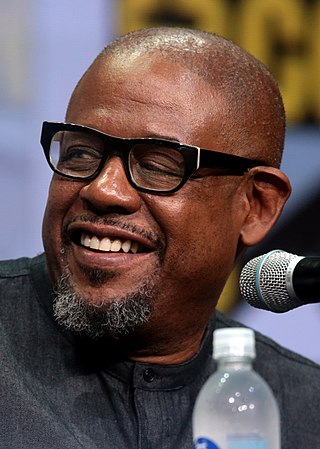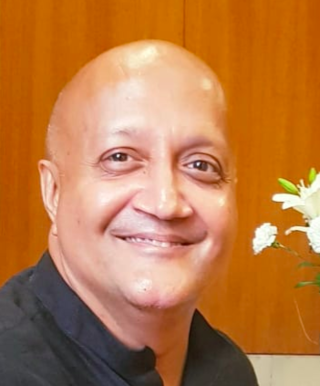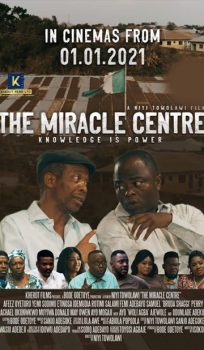Related Research Articles

Akinwande Oluwole Babatunde "Wole" Soyinka is a Nigerian playwright, novelist, poet, and essayist in the English language. He was awarded the 1986 Nobel Prize in Literature for his "wide cultural perspective and... poetic overtones fashioning the drama of existence", the first sub-Saharan African to win the Prize in literature.

Forest Steven Whitaker is an American actor, producer and director. He is the recipient of various accolades, including an Academy Award, a Golden Globe Award, a British Academy Film Award, and two Screen Actors Guild Awards.

Victor Olufemi Adebowale, Baron Adebowale, is the former Chief Executive of the social care enterprise Turning Point and the current Chair of the NHS Confederation, and was one of the first individuals to become a People's Peer.
Olusegun Kokumo Agagu ; 16 February 1948–13 September 2013) was a Nigerian politician who was governor of Ondo State from 29 May 2003 until February 2009, when a court voided his re-election as governor on account of electoral irregularities. He was replaced as governor by Olusegun Mimiko, the runner-up in the election. He was a member of the then ruling Peoples Democratic Party (PDP).

Niyi Osundare is a Nigerian poet, dramatist, linguist, and literary critic. Born on 12 March 1947, in Ikere-Ekiti, Nigeria, his poetry is influenced by the oral poetry of his Yoruba culture, which he hybridizes with other poetic traditions of the world, including African-American, Latin American, Asian, and European.
Wole Oguntokun was a Nigerian playwright, dramaturge, director and was the artistic director of Theatre Planet Studios and Renegade Theatre as well as a member of the board of Theaturtle, a Canadian theatre company. He was also a theatre administrator and newspaper columnist.

Sidney Onoriode Esiri, stylized as Dr SID, is a Nigerian singer.
Andrew Dosunmu is a Nigerian photographer and filmmaker who came to prominence in the United States after directing music videos for various acclaimed artists including Isaac Hayes, Angie Stone, Common, Tracy Chapman, Wyclef Jean, Kelis, Aaron Neville, Talib Kweli, and Maxwell.
Muyiwa Olarewaju is a British Gospel singer and songwriter who mixes traditional gospel music with elements of world music, soul, R&B and pop. He is also an experienced performer, broadcaster and presenter. In 2009 he became the first-ever international act to perform on America's popular entertainment channel, BET, for the prestigious annual Celebration of Gospel show. He has presented the Turning Point programme to an estimated global audience of 70 million. With his group Riversongz, he sold out Indigo2 at the O2 in London, the first gospel act to do so, and he has played at the largest gospel music event in the world, The Experience, attracting a 500,000 strong audience.

Covenant University(CU) is a private Christian university in Ota, Ogun State, Nigeria. It is affiliated with Living Faith Church Worldwide and is a member of the Association of Commonwealth Universities, Association of African Universities, and National Universities Commission. In 2019, Covenant University became the first Nigerian university to be ranked in the top 401-500 category of world universities by Times Higher Education.

Raja Choudhury is a National Film Award (India) winning documentary film maker, architect, public speaker, spiritual teacher on The Shift Network, and designer of multimedia installations and events and Web sites, some of which have received Webby Awards. He produces international documentary films on Indian wisdom, history and consciousness. Films he has made include Spirituality in the Modern World, I Believe: Universal Values for a Global Society, The Modern Mystic, The Quantum Indians, Yoga: Aligning to the Source, and most recently India's official global film celebrating the International Day of Yoga entitled Yoga Harmony with Nature which was released on 21 June 2015. His most recent film with WTTW Chicago PBS is called America's First Guru on Swami Vivekananda and the arrival of Yoga and Hinduism into the popular American conversation in 1893 and airs on Public Television from May 2024. Raja is on the faculty of The Shift Network online, teaching subjects on Indian Wisdom. Raja is also a teacher at A Thousand Suns Academy teaching advanced programs and workshops in Indian wisdom and meditation.

Turning Point is a 2012 drama film written and directed by Niyi Towolawi and starring Jackie Appiah, K.D. Aubert, Todd Bridges, Ernie Hudson, Patience Ozokwor, with Igoni Archibong in leading role of "Ade". It received 2 nominations at the 9th Africa Movie Academy Awards.
Yemi Shodimu is a Yoruba dramatist, television presenter, film director and filmmaker.
Niyi Akinmolayan is a Nigerian filmmaker and director and one of Nollywood’s most successful hitmakers. Five of his films rank in the top 50 highest grossing Nigerian films:The Wedding Party 2 (2017) Chief Daddy (2018), Prophetess (2021), My Village People (2021), and The Set Up (2019). He is also the founder and Creative Director of Anthill Studios, a media production facility. In January 2022, Anthill Studios signed a multi-year deal with Amazon Prime Video to become the exclusive global streaming home for Anthill’s slate of cinema releases following their theatrical runs in Nigeria.
Tchidi Chikere, is a Nigerian movie director who is also a movie producer, scriptwriter, actor, music video director and singer. He has over 100 films and 2 music albums to his credit.

Woli Arole is a Nigerian comedian, actor and on-air personality. Professionally he is called Arole, Woli Arole.
Onyeche Tifase is the Managing Director and Chief Executive Officer of Siemens Nigeria, a position she assumed in 2014. She is the first Nigerian to hold that position. She is also Vice Chairman of the Nigerian Economic Summit Group. She is the President of the Nigerian-German Chamber of Commerce.

My Village People is a 2021 Nigerian comedy supernatural thriller film written by Bovi Ugboma and directed by Niyi Akinmolayan. The film stars Bovi, Nkem Owoh, Amaechi Muonagor and Charles Inojie in the lead roles. The film was premiered at the Filmhouse Cinemas in Lagos on 6 June 2021 and the film had its theatrical release on 11 June 2021. The film is currently available on Netflix.

The Miracle Centre is a 2020 Nigerian comedy film directed by Niyi Towolawi and co-produced by director himself with Odetoye Bode for Kherut Films. The film stars Yemi Shodimu with Hafeez "Saka" Oyetoro, Ayo Mogaji, Femi Adebayo, and Ayobami "Woli Agba" Ajewole in supporting roles. The film tells the story of Panya Grammar School, where a new teacher, Mr. Greg, meets a corrupt education system that he plans to change.
Seyi Ẹdun popularly known as Ẹja nla is a Nigerian actress and film producer. She is well known for her film Ẹja nla, and she is also a wife to the actor, Adeniyi Johnson
References
- ↑ Punch Newspaper, Nigeria
- ↑ nigeriafilms.com
- ↑ Daily Independent
- ↑ The Nation, Nigeria
- ↑ Punch, Nigeria
- ↑ silobreaker.com
- ↑ edostatenews.com